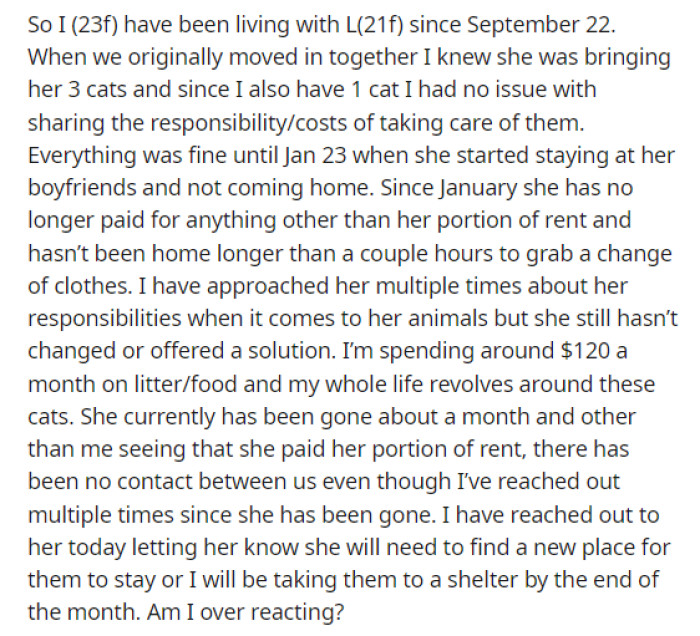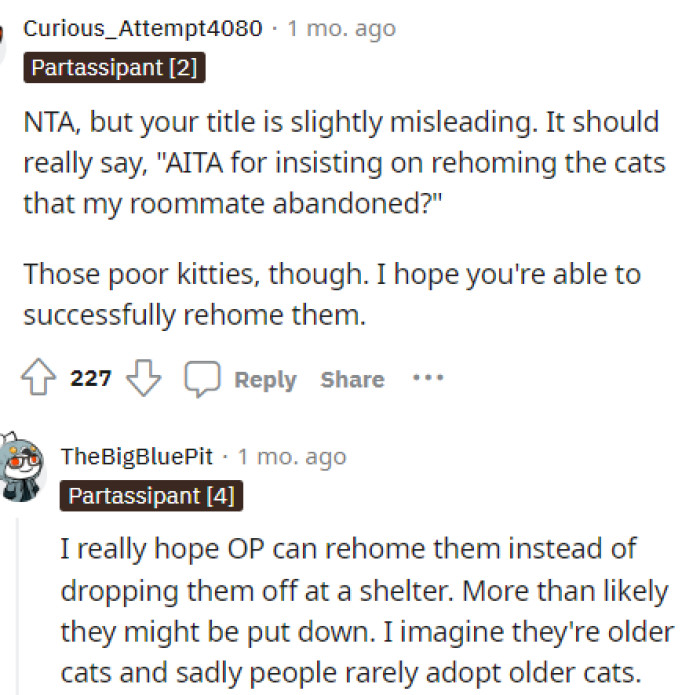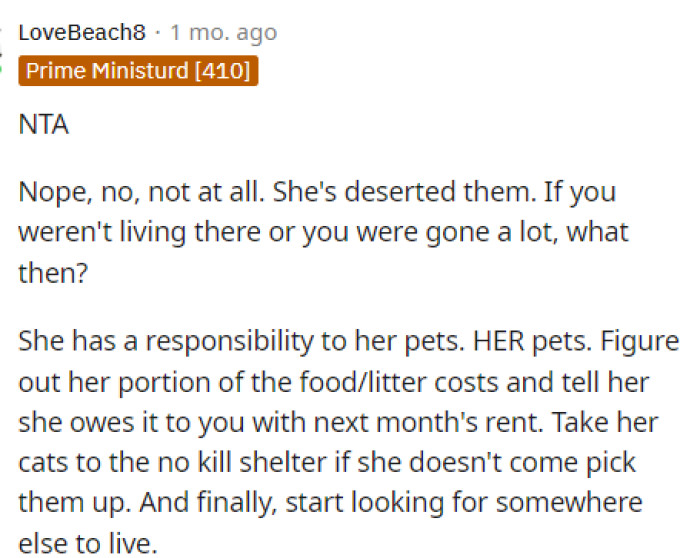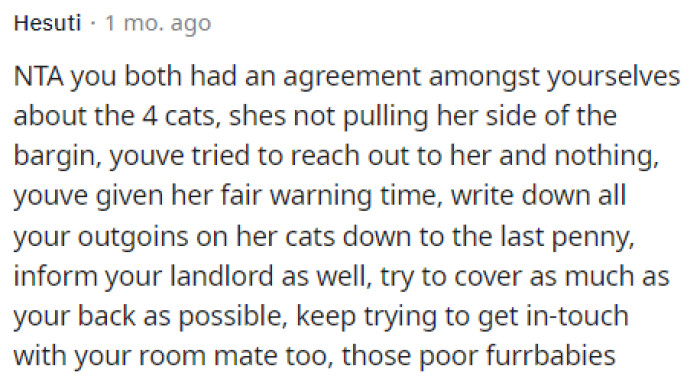Girl Threatens To Take Roommate's Cats To A Shelter After She Abandoned Them To Stay At Her Boyfriend's Place
We are back again today with yet another Reddit post from the AITA thread that we'll be looking into. These threads are always interesting because of the crazy stories and the multiple perspectives we get from the comments.
People come here to get unbiased advice and opinions on their situations to find out if they are wrong in how they act or what they plan to do. With this being said, we are here today to share a story submitted by a girl who wants to know if she's in the wrong for wanting to get rid of her roommate's cats because she's not there to take care of them.
Essentially, this roommate is now living with her boyfriend and isn't taking care of her cats as a result. This has forced OP to care for them in her absence, and she is trying to figure out the best course of action for this situation.
If you want to hear the full story and see what people have to say in the comments, then you'll want to stay tuned and keep on reading. So, without further ado, let's dive into this post and see the whole story, plus some of the best comments.
OP puts her post up very simply and explains the whole situation that she's going through with her roommate and why they aren't on the same page with things anymore.

People thought that this situation was going to be a little worse than it was, but either way, there was a lot that needed to be clarified in the post.

People came to the comments with some suggestions on what she should do in this situation to ensure that both parties are satisfied.

The Dynamics of Pet Ownership in Shared Living Spaces
Managing pets in shared living environments can often lead to additional stress and conflict. According to Dr. Dan Gilbert, a happiness researcher, "When responsibilities are unequally shared, it can create feelings of resentment and frustration." This is particularly true when one roommate feels overburdened by the care of pets not initially agreed upon. In this case, the girl's threat to take the cats to a shelter highlights a significant emotional response driven by frustration and a perceived lack of reciprocity in caring for the animals. As noted by Dr. Susan David, an emotional agility expert, "Such actions can stem from feelings of being overwhelmed or unappreciated, which can lead to impulsive decisions that may not reflect one's true values."
The Complexities of Roommate Relationships
Dr. Hannah Lee, a relational psychologist at Emory University, points out that roommate dynamics can become particularly strained when pets are involved.
Her research shows that feelings of responsibility towards animals can influence interpersonal relationships, often leading to conflict.
Understanding the underlying motivations can be critical in navigating these tensions effectively.
Many people put this into perspective for OP and her roommate because if it weren't for OP, her roommate's cats might not even be alive.

People expressed their opinions, but many were just wanting to see the picture tax from the cat she's talking about.

She is most definitely taking advantage of OP, and something needs to be done about it. OP needs to step up after this.

Moreover, emotional attachment to pets can complicate cohabitation dynamics. Behavioral psychologists note that when one roommate feels that their needs are not being met, it can lead to resentment and conflict. In this instance, the girl's ultimatum may represent a culmination of built-up frustration rather than a desire to harm the cats.
Understanding the underlying emotions can help provide clarity about the roommate’s motivations and foster dialogue aimed at resolving the situation.
Behavioral studies indicate that individuals often project their feelings of attachment and responsibility onto their pets, which can complicate shared living situations.
When one roommate feels abandoned by another's choices, it can lead to feelings of resentment and frustration.
Addressing these feelings openly can help prevent the escalation of conflict and promote understanding.
I wouldn't put the cats out either, but people are telling her that she has to come up with some solution because this one isn't working.

I didn't really consider the fact that there are four cats, which is a lot, and obviously, OP is alone taking care of cats that aren't hers.

This is true too because they already had an arrangement, and she didn't hold her side of the bargain.

Effective Communication Strategies
To address the issues surrounding pet care, initiating an open conversation is essential. The girl should express her feelings regarding the burden of caring for the cats and the need for shared responsibility. Using 'I' statements, such as 'I feel overwhelmed with the responsibility of caring for the cats on my own,' can help frame the discussion in a way that encourages empathy and understanding.
Furthermore, discussing the potential for an equitable division of pet care tasks can help mitigate tension. Research shows that establishing clear agreements about responsibilities can lead to improved satisfaction in shared living situations.
Setting Boundaries Regarding Pets
Establishing clear boundaries around pet care is vital in any shared living situation.
Research suggests that creating a shared pet care agreement can clarify responsibilities and expectations, reducing misunderstandings.
Regular discussions about these agreements can also help adapt to changing circumstances and ensure fairness.
Those are not her cats, and her roommate should be lucky that she's helping with the cats at all.

People had a lot of advice for her in the comments of her post on how she should handle this and what role she plays in all of it. The roommate is lucky that OP was nice enough to care for these cats after she pretty much abandoned them.
She needs to stand her ground on this one.
Psychologists recommend that roommates engage in proactive communication about their needs and concerns regarding pet care.
Research shows that open dialogue can foster a sense of collaboration and mutual respect, leading to more harmonious living environments.
Checking in regularly about pet-related responsibilities can also help address any emerging tensions early on.
Psychological Analysis
This scenario highlights the emotional complexities that arise when caring for pets within shared living arrangements.
It's essential for roommates to communicate openly about their expectations and responsibilities to prevent misunderstandings.
Analysis generated by AI
Analysis & Alternative Approaches
In conclusion, navigating roommate dynamics, especially with pets involved, requires clear communication and understanding.
By fostering an environment of shared responsibility, roommates can reduce conflicts and enhance their living experience.
Additionally, exploring options for pet care, such as scheduling shared responsibilities or seeking external help, could alleviate some of the burden. According to studies in social psychology, collaborative problem-solving can foster cooperation and strengthen relationships among roommates.
Creating a shared calendar for pet care responsibilities can help clarify expectations and reduce frustration, ensuring that both parties feel equally invested in the well-being of the animals.
Psychological Analysis
This situation illustrates the common challenges of sharing pet responsibilities in a communal living environment. It's essential for both parties to engage in open conversations about their feelings and expectations regarding pet care. Building a foundation of mutual respect and cooperation can significantly enhance the living situation for both roommates and their pets.
Analysis generated by AI
Analysis & Alternative Approaches
In conclusion, navigating the complexities of pet care in shared living situations requires open communication and a mutual understanding of each other's perspectives. By establishing clear agreements and fostering a sense of shared responsibility, roommates can create a more harmonious living environment for both themselves and their pets.



